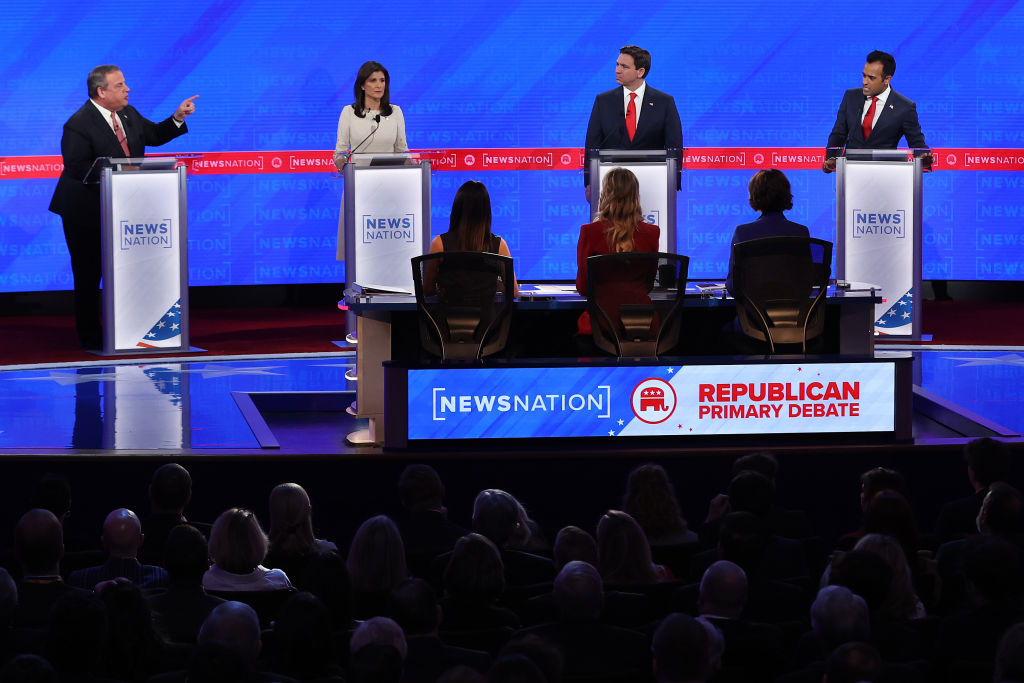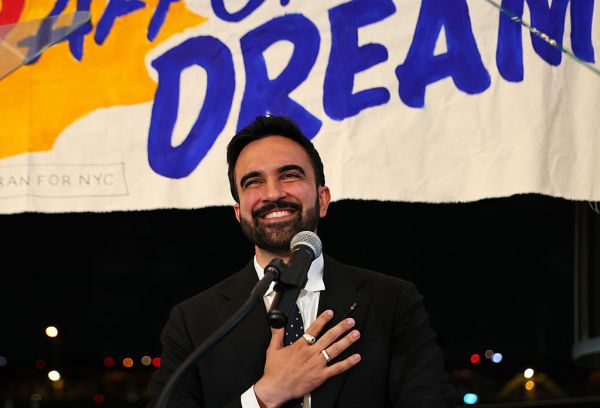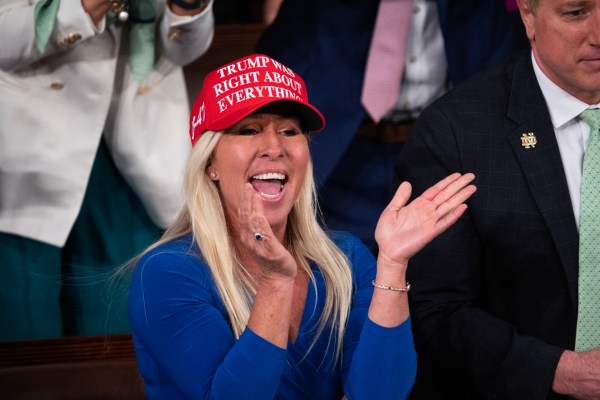Happy Thursday! We could talk about how Time magazine’s Person of the Year added an estimated $4.3 billion to the U.S. GDP this past year, or boosted the local economies of American cities across the nation, or potentially rescued the struggling movie theater industry—but we’re sure by now you know Taylor Swift’s accomplishments all too well.
Quick Hits: Today’s Top Stories
- A gunman working for the Security Service of Ukraine (SBU) on Wednesday reportedly assassinated Illia Kyva, a pro-Russia former member of the Ukrainian Parliament who decamped to Russia before the war began. Kyva was a regular fixture on Russian state TV and repeatedly called for Ukraine to surrender to Russia. He was regarded by the Ukrainian government as a traitor, expelled from the legislature, and sentenced to 14 years in prison on charges of treason earlier this year. Kyva was shot and killed in a park in Odintsovo, a suburb of Moscow. “We can confirm that Kyva is done,” said Andriy Yusov, a spokesperson for Ukraine’s military intelligence unit. “Such a fate will befall other traitors of Ukraine, as well as the henchmen of the Putin regime.”
- Russian President Vladimir Putin on Wednesday met with the leaders of the United Arab Emirates and Saudi Arabia in his first trip to the region since Russia launched its full-scale invasion of Ukraine in February 2022. “We have stable and very good relations in terms of political interaction, economics, and in the humanitarian sector,” Putin said in remarks at his meeting with Saudi Crown Prince Mohammed bin Salman, in which the pair discussed oil production and the Israel-Hamas war. Today, Putin will host Iranian President Ebrahim Raisi in Moscow, where the two are expected to discuss their continued economic and military cooperation.
- The Justice Department on Wednesday unsealed war crimes charges against four “Russia-affiliated military personnel” over their alleged detention and torture of an American citizen in Ukraine. The indictment alleges that two commanding officers in the Russian army and two “lower-ranking” personnel abducted a U.S. national living in Kherson, Ukraine, and then subsequently beat and tortured the individual. Attorney General Merrick Garland said the charges were the first ever brought under the War Crimes Act of 1996. “I can’t get into too many details,” Garland said at a press conference yesterday. “But this is our first, and you should expect more.”
- Former House Speaker Kevin McCarthy announced Wednesday in a Wall Street Journal op-ed that he will not seek reelection and will leave Congress at the end of the year. “It often seems that the more Washington does, the worse America gets,” McCarthy wrote. “I started my career as a small-business owner, and I look forward to helping entrepreneurs and risk-takers reach their full potential. The challenges we face are more likely to be solved by innovation than legislation.” The announcement came about two months after the California Republican was ousted as speaker of the House, and his exit will shrink the House GOP majority to just three votes—that number could fall to two in February if Democrats win the special election to fill George Santos’ now vacant seat.
- The 10 Republican fake electors who tried to overturn Wisconsin’s 2020 election results in former President Donald Trump’s favor agreed to a settlement on Wednesday that acknowledged President Joe Biden won the election. The settlement came in a civil lawsuit filed last year by Democratic electors in the state. The Republican electors also agreed to not serve as electors in 2024 or in any election in which Trump is a candidate, and officially revoked their 2020 fillings that falsely claimed Trump won Wisconsin. “We oppose any attempt to undermine the public’s faith in the ultimate results of the 2020 presidential election,” they said in a statement. “We hereby withdraw the documents we executed on December 14, 2020, and request that they be disregarded by the public and all entities to which they were submitted.”
- Authorities arrested and charged a suspect in a string of shootings in two separate Texas cities on Tuesday that killed six people and wounded three, including two police officers. Over the course of roughly eight hours on Tuesday, the suspect is believed to have killed his parents in a home near San Antonio before committing the shootings at four different locations in Austin—including a high school. Investigators are still determining the motive for the killings.
An Exercise in Futility

As the authors of this newsletter, we are constantly thinking carefully about what is “worth your time” and what isn’t. At the fourth Republican presidential debate last night—held on the campus of the University of Alabama in Tuscaloosa (the event’s introduction subjected viewers to unsolicited footage of the Crimson Tide’s football team)—former U.N. Ambassador Nikki Haley seemed to have been doing some careful thinking of her own.
After biotech entrepreneur Vivek Ramaswamy hoisted his prop notepad in the air revealing the words, “NIKKI = CORRUPT” in black Sharpie—to cheers and even louder boos—the moderators offered Haley a chance at a rejoinder. “It’s not worth my time to respond to him,” she said with a shrug.
This debate—like the three others before it—quickly descended into chaos as the four not-Trump candidates on the stage vied for what is increasingly looking like a second-place trophy. Much of the fire was trained on Haley, who has risen in the polls—and in big-dollar donors’ estimations—over the last several weeks. Moderators tried to force candidates to discuss former President Donald Trump’s increasingly authoritarian rhetoric and serious legal troubles, but didn’t have much success. The attempt was, as ever, a welcome opportunity for former New Jersey Gov. Chris Christie, awkward for the other three candidates on stage, and a boon for the former president in absentia as the Iowa caucuses close in.
Though they rarely addressed the elephant (not) in the room, the past three GOP primary debates offered faint glimmers of hope that the Republicans on stage were interested in substantive policy discussions: an almost thoughtful back-and-forth on the merits of a federalist approach to abortion policy, for example, or revealing, if heated, exchanges on America’s role in the world that laid bare important ideological fissures in the party.
That was decidedly not the message the candidates on stage—down to four after significant consolidation of the field—sent on Wednesday, as they turned the NewsNation moderators into kindergarten teachers trying to keep order over a classroom in chaos. While Haley tried to largely stay above the fray, Christie—who’s been fairly quiet at other debates without his main target, Trump, on the stage—set his sights on Ramaswamy.
As Christie criticized Ramaswamy’s proposal for a peace deal with Russia to end the war in Ukraine, Ramaswamy jumped in to counter. “Don’t interrupt me—I didn’t interrupt you,” Christie yelled with such fervor that the typically brash Ramaswamy paused a full beat before interrupting again. After a third interruption, Christie shouted, “I’m not done yet,” with an accusatory finger pointed at his sparring partner two candidates away. “This is the fourth debate that you would be voted in the first 20 minutes as the most obnoxious blowhard in America,” he said to raucous cheers (one of the few times he generated them). “So shut up for a little while.”
After briefly, and unconvincingly, trying to play the nice guy in the second debate, Ramaswamy once again leaned into his persona as the “unhinged” foil to his “bought and paid for” opponents. And while the youthful entrepreneur has always been an avatar of the super-online right wing of the party, he turned his act up to eleven on Wednesday.
“If you want someone who’s going to speak truth to power,” Ramaswamy said, winding up, “then vote for someone who’s going to speak the truth to you.” Then, the pitch: “Why am I the only person—on the stage, at least—who can say that January 6 now does look like it was an inside job; that the government lied to us for 20 years about Saudi Arabia’s involvement in 9/11; that the ‘Great Replacement Theory’ is not some grand right-wing conspiracy theory, but a basic statement of the Democratic Party’s platform; that the 2020 election was indeed stolen by Big Tech; that the 2016 election—the one that Trump won for sure—was also one that was stolen from him by the national security establishment that actually put up the Russian collusion hoax that they knew was false?” No one—not the candidates, not the moderators—wanted to touch any of that with a ten-foot pole, and the conversation swiftly moved on.
Given Haley’s relative momentum, much of the night’s heated and disorderly exchanges were driven by attempts to knock her down a few pegs. “I love all the attention, fellas,” she said after Ramaswamy and Florida Gov. Ron DeSantis opened the debate with twin attacks on her (somewhat walked-back) proposal to crack down on anonymous social media accounts she views as a national security threat. She faced heat for that issue (“The only person more fascist than the Biden regime now is Nikki Haley,” Ramaswamy remarked, to boos), and was accused of being soft on China and cozy with “the establishment”—a charge that followed recent big-money endorsements for Haley from liberal billionaires including JPMorgan’s Jamie Dimon and LinkedIn co-founder Reid Hoffman.
The focused attacks on Haley were to be expected. She’s seen a surge in both polling numbers and big name endorsements in recent weeks—while DeSantis, initially the favorite to unseat Trump, has seen his numbers tumble. Haley is polling just three points behind a second-place DeSantis in Iowa, according to the RealClear Politics polling average, and is in second place herself in the New Hampshire polling average, more than seven points ahead of her nearest competitor, Christie. At the end of November, the Koch-affiliated Americans for Prosperity (AFP) announced its endorsement of Nikki Haley, lending much-needed grassroots and financial support to her campaign. “They’re just jealous,” Haley said, responding to attacks from Ramaswamy and DeSantis. “They wish that they were supporting them.”
While that line received cheers and applause, Haley’s performance lacked some of the made-for-TV moments from previous debates. She remained quiet during much of the infighting on stage, likely in an attempt to stay above the fray but also leaving several jabs from her opponents unanswered. At one point, during a particularly pointed attack from Ramaswamy regarding the former U.N. ambassador’s foreign policy “wisdom” versus “experience,” it was Christie that leapt to Haley’s defense. His skewering of Ramaswamy—while chivalrous—might have done Haley more harm than good, robbing her of an opportunity to demonstrate her own toughness, no matter how juvenile the enemy. Whether her strategy came across as presidential or passive remains to be seen.
The candidates were able to discuss some policy positions at length. While many questions—on Israel, China, and the economy, for example—offered the presidential hopefuls an opportunity to trot out familiar lines and underscore their conservative beliefs, a few novel proposals and breaks from orthodoxy emerged.
A question regarding gender-transition treatments for minors, for example, revealed the gulf between Christie and the rest of the stage. When asked why he didn’t believe in a ban on such surgeries—and if it left him too “out of step” with Republican primary voters—Christie pushed back. “Republicans believe in less government, not more,” he said. “You look at these jokers down in Congress. It takes them three weeks to pick a speaker … And we’re going to put my children’s health and my decisions in their hands? … Let me just say this: This is not something I favor. I think it’s a very, very dangerous thing to do. But that’s my opinion as a parent, Megyn. And I get to make the decisions about my children, not anybody else. And every parent out there who’s watching tonight, you start to turn over just a little bit of this authority—the authority they’re going to take away from you next, you’re not going to like. I’ll stand up for parents each and every time.”
DeSantis used the opportunity to flex what he’s done in Florida and hit Haley over so-called “bathroom bills” in the process. “I don’t think men should be going into little girls’ bathrooms,” he said. “I think it’s wrong, and I think we have every right to protect them from that.” When Haley tried to defend her record—over a bill that came up when she was governor 10 years ago—DeSantis dryly replied, “You killed it; I signed it. I stood up for little girls; you didn’t do it.”
The candidates managed to sneak in a few other policy proposals. Haley suggested taking tax-exempt status away from universities that do not protect Jewish students or condemn antisemitism. DeSantis proposed shifting the burden of student loans from the government to the universities and placing more emphasis on vocational training. Even Ramaswamy, whose wife is a surgeon, proposed beefing up the health care system to include more preventative care options.
Despite the yelling and theatrics, the outcome of this debate is likely to mirror that of the previous three—a win for former President Donald Trump. Only Christie directly took on the former president, and did so in seemingly every answer. He called out Trump’s recent promise to not be a dictator “except on day one,” and criticized the other candidates on the stage for pledging to support Trump should he be indicted and win the nomination. At one point, he laid into DeSantis for equivocating on whether he believed Trump was fit or unfit for the office, saying only that “Father Time is undefeated” and that it would be better to elect someone who wasn’t pushing 80 years old.
“He won’t answer [the question],” Christie interjected. “He’s afraid to answer.”
“No I’m not!” DeSantis shot back, before again refusing to directly address Trump’s fitness. In her closing statement, Haley vowed to lead the nation away from the chaos of the Biden and Trump administrations, and said her approach included “no drama, no vendettas, no whining.”
The former president spent the night at a private fundraiser, and though his ears may have been ringing, the noise certainly wasn’t enough to lure him into the fray. If Trump for a moment has considered whether or not he should attend any of the cycle’s debates, he can probably rest easy and borrow Haley’s now-famous line of the night. If his four main primary competitors aren’t going to bother bringing the fight to him while they actually have the spotlight, perhaps it’s not worth his time to show up.
Worth Your Time
- A recent study published in Nature offers a theory as to why there are fewer new ideas in scientific research. “A widely held view is that by permitting more specialization and better matching, the rise of remote collaboration promises larger ‘collective brains’ and accelerated innovation,” the authors wrote. “Indeed, seen through the lens of recombinant growth theory, a larger number of possible collaborations increases the number of possibilities for new discoveries. Yet, in contradiction to this promise, recent work has shown that ‘ideas are getting harder to find.’ One possible explanation for this apparent puzzle is that although remote collaboration among specialized researchers permits more new combinations of knowledge, it also makes it harder for teams to integrate the pieces. In the early stages of a project, when an idea is hard to articulate and knowledge is tacit, collaboration at a distance is particularly challenging. However, when an idea crystallizes and knowledge becomes more codified, the comparative advantage of on-site teams is gradually diminished. It follows that scientists in on-site teams are better placed to fuse knowledge and conceive the next breakthrough idea, whereas they tend to coordinate technical work and develop established ideas when switching to remote.”
Presented Without Comment
Rep. Kevin McCarthy, announcing his retirement from the House and reflecting on his career: “I never could have imagined the journey when I first threw my hat into the ring. I go knowing I left it all on the field—as always, with a smile on my face. And looking back, I wouldn’t have had it any other way.”
Toeing the Company Line
- In the newsletters: The Dispatch Politics crew covered Trump’s ‘jokes’ about becoming a dictator, Scott outlined (🔒) how government policy is dragging down the offshore wind energy industry, Nick explained why (🔒) he thinks the House GOP’s Ukraine gambit is politically savvy, and Jonah argued antisemitism is a symptom of a deeper disease.
- On the podcasts: Sarah and David unpack the civil rights implications of a recent congressional hearing on antisemitism at top American universities, while Francis Dearnley of the Telegraph’s “Ukraine: The Latest” joins Jonah on The Remnant to discuss the future of the embattled country.
- On the site: Newest Dispatcher John McCormack explores the Democratic Party’s antisemitism problem, Charlotte details how Israeli civil society is stepping up in the wake of October 7, and Kevin discusses Democrats’ trouble with Kamala and Joe.
Let Us Know
Do you think there were clear winners or losers in last night’s debate?








Please note that we at The Dispatch hold ourselves, our work, and our commenters to a higher standard than other places on the internet. We welcome comments that foster genuine debate or discussion—including comments critical of us or our work—but responses that include ad hominem attacks on fellow Dispatch members or are intended to stoke fear and anger may be moderated.
With your membership, you only have the ability to comment on The Morning Dispatch articles. Consider upgrading to join the conversation everywhere.